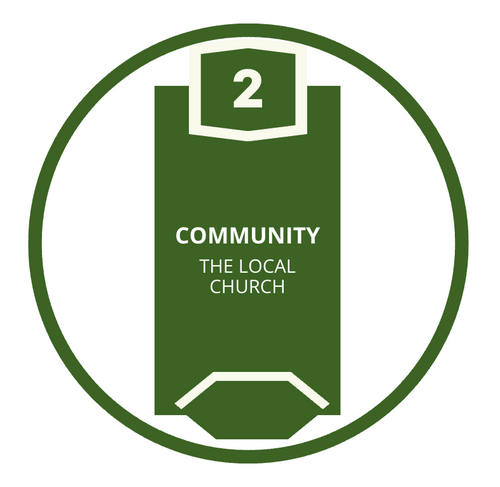

Download To Listen:

Welcome to Day 11! We will turn our direction toward a new pillar within our faith called Community. We were never called to walk this life alone, and the first example of this is found in Genesis 2, where God creates Eve to accompany Adam (Genesis 2:18). We learn throughout Scripture that God finds joy in creating and having fellowship with both spiritual and earthly beings. This is an expression of His love and desire. God wants a relationship with us; that is why we are here. In your new life through Christ, you are now adopted into a new family (Galatians 4:4–7), a spiritual family called the “body of Christ,” which is made up of many different types of people. Even if you never had a biological brother or sister, you now have many brothers and sisters stretched across the earth. This is the beauty of our new life.
Old Testament "Assembly"
Throughout scripture, we see communities formed out of their belief and desire to worship God. The idea of the "church" actually existed before Jesus came. Instead of using the word church, they would use the word "assembly.” If you look up the word church in Greek (ekklēsia), it means assembly. There is a distinction between the words assembly and church because of who makes up "the church,” which is Christ's followers.
An Old Testament assembly differed from our experience in today's church service. We see several examples in the Old Testament that give us details on what services were like. Mostly it was composed of the Israelites, but they did have various people from different tribes or nationalities named sojourners (2 Chronicles 6:32-33) within their gatherings as well.
In some aspects, the Old Testament assembly meetings would look very familiar to us today. In the Old Testament, we see worshipers of God praising/singing, reading scripture, confessing sin, and praying together.
Nehemiah 9:3 "They stood where they were and read from the Book of the Law of the Lord their God for a quarter of the day, and spent another quarter in confession and in worshiping the Lord their God.”
2 Chronicles 29:28 "The whole assembly bowed in worship, while the musicians played and the trumpets sounded. All this continued until the sacrifice of the burnt offering was completed.”
We even see in the New Testament where they confirm some of these practices, for instance, in Acts 15.
Acts 15:21 "For the law of Moses has been preached in every city from the earliest times and is read in the synagogues on every Sabbath.”
The practice of worship in the Old Testament was very different because it was prior to Christ offering salvation. A major piece of their services was to offer sacrifices and follow specific guidelines to be made right with God that day. This was practiced and performed continuously because there were no permanent solutions to combat sin. That all changed when Christ came; we no longer had to practice "physical sacrifices" to cover our sins because Christ became the permanent sacrifice, once and for all.
An Old Testament assembly differed from our experience in today's church service. We see several examples in the Old Testament that give us details on what services were like. Mostly it was composed of the Israelites, but they did have various people from different tribes or nationalities named sojourners (2 Chronicles 6:32-33) within their gatherings as well.
In some aspects, the Old Testament assembly meetings would look very familiar to us today. In the Old Testament, we see worshipers of God praising/singing, reading scripture, confessing sin, and praying together.
Nehemiah 9:3 "They stood where they were and read from the Book of the Law of the Lord their God for a quarter of the day, and spent another quarter in confession and in worshiping the Lord their God.”
2 Chronicles 29:28 "The whole assembly bowed in worship, while the musicians played and the trumpets sounded. All this continued until the sacrifice of the burnt offering was completed.”
We even see in the New Testament where they confirm some of these practices, for instance, in Acts 15.
Acts 15:21 "For the law of Moses has been preached in every city from the earliest times and is read in the synagogues on every Sabbath.”
The practice of worship in the Old Testament was very different because it was prior to Christ offering salvation. A major piece of their services was to offer sacrifices and follow specific guidelines to be made right with God that day. This was practiced and performed continuously because there were no permanent solutions to combat sin. That all changed when Christ came; we no longer had to practice "physical sacrifices" to cover our sins because Christ became the permanent sacrifice, once and for all.
New Testament "Church"
Now, as we fast-forward, we come to the New Testament and meet up with Jesus. While He was fulfilling His earthly ministry, we see that He made a very important declaration for the future community of worshipers in Matthew 16.
Matthew 16:18 "And I tell you that you are Peter, and on this rock, I will build my church, and the gates of Hades will not overcome it."
It is at this moment that Jesus declares that He will establish this community of people that will not be defeated by the works of the enemy nor the flesh, and they will be called the church. We are His people because He is the only way back to the Father, so He is our leader and our Lord.
Ephesians 1:22-23 And God placed all things under his feet and appointed him to be head over everything for the church, 23 which is his body, the fullness of him who fills everything in every way.”
This community will consist of Christ's followers, and it will be made up of Jews and Gentiles (meaning open to all people groups). You can think of Jesus's death on the cross as the unifier of all people and nations because He created a pathway for all to receive salvation (Isaiah 49:6, John 8:12). Even though sojourners/foreigners were a part of worship services before Christ, it wasn't as common for Gentiles to accept the God of Israel because of their idol worship and devotion to other gods. But this didn't exclude foreigners (non-Israelites) from playing major roles in the Old Testament. People like Ruth, Jethro, and Rahab played very important roles in the Old Testament. These non-Israelite figures demonstrated how God's plan of redemption and involvement extends beyond the boundaries of Israel in the Old Testament and how God used individuals from various nations to accomplish His purposes in the biblical narrative, which is confirmed in Ephesians 2.
Ephesians 2:19-20 "Consequently, you are no longer foreigners and strangers, but fellow citizens with God’s people and also members of his household, 20 built on the foundation of the apostles and prophets, with Christ Jesus himself as the chief cornerstone."
As you might have concluded, the church is not just a physical location where believers come together in a building: it's deeper than that. It is true that in part we do go to a physical structure called "the church,” or you might read it in scripture as temples or synagogues, but overall, the church is a collective group of Christian believers under the authority of Christ. Although there are many people who make up the church stretched all over the world, we are one, unified by Christ Himself and through the Holy Spirit. As a group, we are called by Christ to carry out His will and mission collectively here on earth.
Ephesians 4:4 There is one body and one Spirit, just as you were called to one hope when you were called;
Matthew 16:18 "And I tell you that you are Peter, and on this rock, I will build my church, and the gates of Hades will not overcome it."
It is at this moment that Jesus declares that He will establish this community of people that will not be defeated by the works of the enemy nor the flesh, and they will be called the church. We are His people because He is the only way back to the Father, so He is our leader and our Lord.
Ephesians 1:22-23 And God placed all things under his feet and appointed him to be head over everything for the church, 23 which is his body, the fullness of him who fills everything in every way.”
This community will consist of Christ's followers, and it will be made up of Jews and Gentiles (meaning open to all people groups). You can think of Jesus's death on the cross as the unifier of all people and nations because He created a pathway for all to receive salvation (Isaiah 49:6, John 8:12). Even though sojourners/foreigners were a part of worship services before Christ, it wasn't as common for Gentiles to accept the God of Israel because of their idol worship and devotion to other gods. But this didn't exclude foreigners (non-Israelites) from playing major roles in the Old Testament. People like Ruth, Jethro, and Rahab played very important roles in the Old Testament. These non-Israelite figures demonstrated how God's plan of redemption and involvement extends beyond the boundaries of Israel in the Old Testament and how God used individuals from various nations to accomplish His purposes in the biblical narrative, which is confirmed in Ephesians 2.
Ephesians 2:19-20 "Consequently, you are no longer foreigners and strangers, but fellow citizens with God’s people and also members of his household, 20 built on the foundation of the apostles and prophets, with Christ Jesus himself as the chief cornerstone."
As you might have concluded, the church is not just a physical location where believers come together in a building: it's deeper than that. It is true that in part we do go to a physical structure called "the church,” or you might read it in scripture as temples or synagogues, but overall, the church is a collective group of Christian believers under the authority of Christ. Although there are many people who make up the church stretched all over the world, we are one, unified by Christ Himself and through the Holy Spirit. As a group, we are called by Christ to carry out His will and mission collectively here on earth.
Ephesians 4:4 There is one body and one Spirit, just as you were called to one hope when you were called;
The Body Of The Believer "The Temple"
We have one last step in understanding the church, which affects us as believers on a personal level. Scripture gives us awareness that our own physical bodies are temples. Because we now have the Holy Spirit, as believers in Christ, we are actually hosting the Holy Spirit within our physical bodies.
1 Corinthians 3:16 Don’t you know that you yourselves are God’s temple and that God’s Spirit dwells in your midst?
1 Corinthians 3:9 For we are co-workers in God’s service; you are God’s field, God’s building.
This is important to realize because we can now have fellowship with God continuously, because we are made perfect through the blood of Jesus Christ (meaning because of His sacrifice). Since this is true, the Holy Spirit has the ability to rest within the believer permanently because we have been purified and made holy by accepting Christ as Lord. This is what enables the Holy Spirit to dwell within the believer. Having the Holy Spirit doesn't mean we will act perfectly in everything we do, but it gives us the ability to live out God's will and His purpose for us.
1 Corinthians 3:16 Don’t you know that you yourselves are God’s temple and that God’s Spirit dwells in your midst?
1 Corinthians 3:9 For we are co-workers in God’s service; you are God’s field, God’s building.
This is important to realize because we can now have fellowship with God continuously, because we are made perfect through the blood of Jesus Christ (meaning because of His sacrifice). Since this is true, the Holy Spirit has the ability to rest within the believer permanently because we have been purified and made holy by accepting Christ as Lord. This is what enables the Holy Spirit to dwell within the believer. Having the Holy Spirit doesn't mean we will act perfectly in everything we do, but it gives us the ability to live out God's will and His purpose for us.
The Church
As we have uncovered, the church is a global living, active group of Christ followers that come together to worship and honor God by carrying out His will on earth. We are unified underneath the name of Christ, but as individuals, we each play our part to glorify God. As we continue over the next few days, we will uncover the importance and the details of worship gatherings, spiritual gifts, accountability, and the importance of our roles within the Church.
